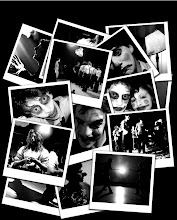Over the last year, I have heard a number of people argue the case that ‘no-one is making any money here’. This statement is made referring to a theatrical enterprise, a theatre or company that holds the potential to be something great, something financially viable, something that in the right hands could become a sustainable commercial venture. But this statement, ‘no one is making any money’, is made and it is spoken with a sense of pride. The tone of voice offers the sense that the individual feels they are truly an artist; that the lack of income for their project somehow represents a sense of honesty and morality that cannot be found in the commercial theatre. Perhaps even the idea that commercial theatre is something to be frowned upon, that the practical business logistics that keep the industry running are somehow a negative force. It seems as if some have forgotten the aspect of business in show-business. I feel small companies should be making money, or at least covering their costs. It is rare that the justification for losing money on a project is viable. Occasionally someone will talk of a project that can never be financially viable, where the nature of the project, where its artistic principles are so strong that it cannot fit into a commercially compatible format. These projects will no doubt rely on subsidy, on support from funding; they are unable to exist commercially. In my opinion, this is totally acceptable but rare. From where I sit, too often work is produced that exists through funding, from the support of an external body that, if successful, could exist without it. If the project has the potential to be viable, it should be. The idea that without the support of external bodies, projects cannot exist is applied too widely across the industry. If the show has the capacity to exist but does not succeed through a lack of commercial success, then the project has failed. As companies should we expect for someone else to be subsidising our trade? To play devil’s advocate, should the tax payers be paying for something that they don’t want to see?
Having produced dozens of shows for Belt Up Theatre, a company that relies on a sense of intimacy between the audience and the show, people often question how we can achieve this artistically without sacrificing the financial side. The answer is, with great difficulty. However, all these difficulties aside, we have succeeded in avoiding the dilution of our artistic principles with business practicality. The difficulties we have faced over the last year and a half have challenged the very existence of the company. Now, just into our second year as a professional company, we face the most difficult challenge of all and it has nothing to do with sustaining artistic morals, but facing what all commercial entities must face.
This run in London has confronted us with the reality of the risk that we take in producing commercial theatre. And the risk, unfortunately, is a financial one. When a production relies entirely on sales, the capital raised for the project hangs by a thread and, at the end of the day, it is the public that makes the call. If the show is a success, the money is returned safely, if not, then you are left facing the deficit. The reality of the financial risk you take when producing a show is distant and unrealistic at best, the figures exist in a spreadsheet fiction where the implications of loss cannot be factored. To consider the outcome of such a loss isn’t constructive and, at worst, is potentially destructive. When this risk exists only in figures placed in a spreadsheet in formulas that treat it no differently to any mathematical equation it is something intangible, something that bears no resemblance to reality. And the reality only forms when the figures on the spreadsheet no longer represent a hypothetical profit or loss but represent a genuine, actual loss.
For a company that relies entirely on the financial and commercial success of every single project, the reality of actual loss holds potentially devastating consequences. The position of the producer within this enterprise is to closely observe and monitor the finance of such a project. The reality of the deficit that can grow is one that can appear long before the run closes. As daily sales reports demand higher rates of sales in the oncoming performances, the spreadsheet’s required capacity percentages begin to soar steadily. First through the feasible, then into the unrealistic and eventually the impossible. The public, the taxpayers, have spoken. Finally the theoretical is made real and for a young company, and its young producer, this loss is difficult both financially and emotionally. It makes you question the cost of what you’re doing. It brings the true risk into perspective. And it makes you think, ‘wouldn’t it be great to be subsidised.’
Jethro Compton - Co-Artisitc Director and Producer









